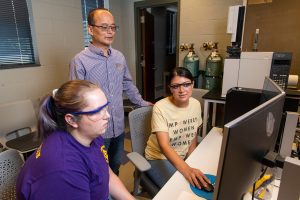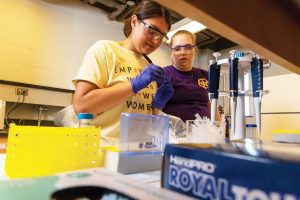Western Illinois University Receives Federal Grant for Cannabis Testing
Although cannabis testing is an everlasting topic in the curriculum of the Bachelor of Science in Forensic Chemistry program in the Western Illinois University Department of Chemistry, it was recently revitalized by a $160,181 grant, awarded by the National Institute of Justice (NIJ) and a Certification of Registration (COR), presented by the Drug Enforcement Administration (DEA).

Valenzuela and Carlson are pictured with WIU Associate Professor of Forensic Chemistry Liguo Song
In the Federal Controlled Substance Act (CAS) of 1970, cannabis was classified as a “Schedule 1” substance, which made cultivation and use of cannabis illegal. Since then, cannabis has become the most widely used illegal drug in the United States; and cannabis testing represented the bulk of the work in most forensic laboratories.
However, Americans have long favored the use of cannabis for medical and recreational purposes. In recent years, an increasing number of states have laws in conflict with the federal position. At present, 34 states and the District of Columbia have passed medical marijuana laws, and among them 11 states and the District of Columbia have passed recreational marijuana laws.
Botanically, cannabis has two primary species commonly known as marijuana and hemp. Marijuana is a psychotropic drug and hemp is used to produce many consumer products, from fibers to edibles, which is characterized of low levels of THC, and high levels of cannabidiol (CBD), a non/antipsychoactive compound with recently accepted medical use.
Cannabis plants exert psychotropic effects when the THC concentration approximates 1 percent. In December 2018, Congress enacted the 2018 Farm Bill, which excluded hemp from the statutory definition of cannabis.
Currently, there is an urgent need for validated methods to measure the total THC concentration in various cannabis products by crime laboratories. With the NIJ grant, WIU Associate Professor of Forensic Chemistry Liguo Song and his students will validate a method using LC (liquid chromatography) coupled with DAD (diode array detector) and ESI/MS/MS (electrospray ionization tandem mass spectrometry) for the accurate measurements for a wide variety of cannabis products such as dried flowers, concentrates, edibles and topical, a total of 68 different types of sample.
“Our research will be based on the newly acquired Agilent 6545 QTOF LC/MS system,” said Song.
The instrument was funded by the National Science Foundation (NSF) on July 30, 2018, and is housed in the Western Illinois Mass Spec Center in Currens Hall, room 311, under Song’s direction.
“We are excited about this award because it recognizes not only our research, but also our educational capabilities,” said Song. “The grant award includes funds to support two graduate and two undergraduate students to do summer research in both 2021 and 2022. It also

WIU chemistry students Gabrielle Valenzuela, of Oswego, and Shelby Carlson, of Daveport, IA, work on testing in a Currens Hall laboratory at WIU.
includes funds to support two students to attend the American Academy of Forensic Science (AAFS) annual meeting in spring 2022. The commitments by the department, college and WIU in undergraduate research have really helped us in securing the award.”
As medicinal and recreational cannabis markets continue to grow, many academic programs with regard to cannabis have emerged in the country, including two cannabis-related minors at WIU, Cannabis and Culture, and Cannabis Production.
“Although marijuana is now legal in the state of Illinois, it is still illegal at the federal level. To conduct research in marijuana, we have to register with the DEA.” said Song. “Now that we have a COR, presented by the DEA, our students are able to have hands-on working experience with marijuana, which will spur new career opportunities for them.”
A bonus of the research, Song added, is that it provides opportunities to local farmers.
“The Western Illinois Mass Spec Center sincerely invites the cannabis industry in the state of Illinois for collaboration in cannabis-testing solutions,” Song said. “Besides accurate potency testing, the Western Illinois Mass Spectrometry Center is also able to cover a range of other applications, e.g. terpene profiling and contaminant testing for residual solvents, pesticides and mycotoxins.”
For more information on the B.S. Forensic Chemistry program at WIU and the Western Illinois Mass Spec Center, visit wiu.edu/cas/chemistry/forensic.php or wiu.edu/mass_spectrometry/.









